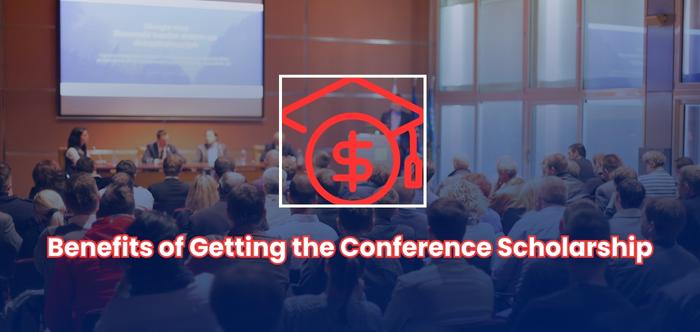In today’s society, where professional development and networking are key to career advancement, conferences play an important role. They are hubs for knowledge exchange, innovation, and collaboration. However, the cost of attending these events can be a significant barrier for many. This is where the concept of a conference scholarship comes into play. But what is a conference scholarship?
Essentially, a conference scholarship is a financial grant designed to open doors for individuals who might otherwise be unable to participate in such gatherings. These scholarships, often aimed at promoting diversity and inclusivity, allow all attendees to experience a broader range of perspectives and voices.
They show a strong commitment to making knowledge and opportunities available to everyone, regardless of their financial situation. To learn more about conference scholarships, check out our article below.
What Scholarship is All About?
Scholarships play a crucial role in educational advancement, providing financial support to deserving students. They open doors to opportunities otherwise inaccessible, fostering academic growth and professional development. Scholarships are vital in shaping the futures of ambitious learners.
By alleviating financial burdens, scholarships enable students to focus on their studies. This support can come from various sources, including educational institutions, organizations, or private donors. It’s a powerful tool for fostering equality in education.
These funds often cover tuition, books, and sometimes living expenses, greatly easing the financial strain. Scholarships are awarded based on merit, need, or specific criteria set by the donor. They are key in promoting educational diversity and inclusivity.
What is a Conference Scholarship?
A conference scholarship is a unique form of financial aid designed for individuals looking to attend professional events. Unlike traditional scholarships focused on academic tuition, these are meant to cover conference-related expenses. They help ensure diverse participation, making it possible for students, researchers, and professionals to engage in valuable discussions and networking opportunities.
These scholarships typically cover costs such as registration fees, travel, accommodation, and sometimes daily allowances. Many recipients use this support to attend specialized events that align with their academic or career goals. International conferences, known for bringing together experts from various fields, offer a platform for global discussions and professional growth. For instance, scholarships for conferences in Canada enable participants to join international discussions, connect with industry leaders, and gain insights from experts in their field.
The application process varies depending on the sponsoring organization or institution. Selection criteria often include academic achievements, professional contributions, or the potential impact of the event on the applicant’s career. Some scholarships also focus on increasing diversity by supporting underrepresented groups in professional fields.
Receiving a conference scholarship is more than just financial aid; it provides access to knowledge and career-building experiences. Attendees get the chance to present their work, learn from others, and establish meaningful connections. These opportunities contribute to professional growth while fostering collaboration and knowledge exchange across different disciplines.
Different Types of Conference Scholarships
Conference scholarships are diverse, and tailored to suit various needs and objectives. These financial aids significantly reduce the barriers to accessing important learning and networking platforms. An applicant can find the right fit for his or her needs by understanding the different types.
Academic Scholarships for Conferences
Primarily aimed at students and researchers, academic conference scholarships support participation in scholarly events. These are often granted by educational institutions or academic societies based on academic excellence or research potential. They enable recipients to present papers, network with peers, and gain new insights in their fields. This type also focuses on subjects relevant to the applicant’s field of study or research.
Professional Development Scholarships
These scholarships are designed for professionals seeking to enhance their skills and industry knowledge. Often sponsored by corporations or professional associations, they cover expenses for attending industry-specific conferences. Applicants are usually selected based on their professional achievements and the potential impact of the conference on their careers. This type emphasizes ongoing learning and networking within a specific industry.
Inclusivity-Based Scholarships
Aimed at promoting diversity and equal opportunity, inclusivity-based scholarships support underrepresented or marginalized groups. These can be based on ethnicity, gender, disability, or socioeconomic status. They ensure diverse perspectives are present at conferences, enriching the discourse and networking opportunities. Such scholarships demonstrate a commitment to inclusivity in professional environments.
Travel and Accommodation Scholarships
Some scholarships specifically address the travel and accommodation expenses associated with attending a conference. This is particularly helpful for international conferences or events in high-cost locations. These scholarships may not cover the conference fee but significantly reduce the overall expense. They are vital for enabling broader participation, regardless of geographic or financial constraints.
Conference scholarships play a key role in fostering knowledge sharing, professional growth, and inclusivity across various fields. Potential applicants can identify and apply for scholarships that align with their needs and aspirations by understanding the types available.
Types of Conference Funding: Who Pays for Your Attendance?
“Conference scholarship” can mean different sources of support. Sometimes your workplace pays, sometimes the conference organizer helps, and sometimes an outside group provides funding. Knowing which one you are applying for matters because the requirements and documents are often different.
Internal Funding (Employer or University Pays)
Support may come from your company, department, or university. Approval often depends on showing how the conference connects to your role or study. A short request, a clear budget, and a plan to share what you learn can improve your chances.
External Funding (Conference Organizer Pays)
Many conferences offer scholarships that cover registration and sometimes travel or accommodation. Selection is usually based on fit, need, and value to the event. Strong applications explain why you want to attend and how your participation supports the conference theme.
Third Party Grants (Foundations or Programs Pay)
Funding can also come from foundations, associations, NGOs, or special programs. These options may require stricter eligibility rules and more documents, like recommendations, a short proposal, or proof of impact. Deadlines can be earlier, so planning ahead helps.
How to Get a Scholarship for a Conference?
Securing a scholarship for a conference can seem daunting, but with the right approach, it’s certainly achievable. This step-by-step guide is designed to simplify the process, helping you go through the path to obtaining a conference scholarship. Whether you’re a student, a professional, or someone looking to expand your horizons, these steps will steer you in the right direction.
Step-1: Identify Suitable Conferences
Start by identifying conferences that align with your field of study or professional interests. Research extensively to find events that offer scholarship opportunities. Keep an eye out for conferences that actively promote diversity, inclusivity, or specific support for students and early-career professionals. This is crucial when applying for conference scholarships.
Step-2: Understand the Scholarship Criteria
Each conference scholarship has its own set of criteria. Read the eligibility requirements carefully to ensure you meet them. For a strong scholarship application, it is imperative to understand what the scholarship committee is looking for – academic excellence, professional accomplishments, or a specific demographic.
Step-3: Prepare Your Application
Begin preparing your application well in advance. This often includes writing a motivation letter or essay, preparing a professional resume, and sometimes a proposal or abstract of your work if you intend to present it. Ensure these documents are well-written, clear, and directly address the scholarship’s requirements.
Step-4: Seek Recommendations
Strong letters of recommendation can significantly bolster your application. Reach out to mentors, academic advisors, or professional supervisors who are familiar with your work and character. Inform them about the specific conference and scholarship to tailor their recommendations effectively. The following is an example:
Subject: Motivation Letter for Conference Scholarship Application
Dear Scholarship Committee,
I am writing to apply for the conference scholarship to attend [Conference Name] on [Date] in [City/Country]. This event strongly matches my interest in [your field/topic], and it will help me learn from expert speakers, explore new ideas, and understand current trends. I am especially interested in sessions like [session/topic name] because they connect closely with my current work in [project/study/job role].
Right now, I am working on [briefly describe your project/research/work], where I focus on [1–2 key tasks or goals]. Attending this conference will improve my knowledge, help me build practical skills, and give me a chance to connect with people who are doing similar work. I also plan to bring these learnings back to my community by sharing notes and key takeaways through [a short talk, a blog post, a team meeting, a workshop, etc.].
This scholarship is important because the full cost of attending, including registration, travel, and accommodation, is difficult to manage on my current budget. With your support, I will be able to participate fully and make the most of the sessions and networking opportunities. Thank you for considering my application. I would be grateful for the chance to represent [your school/organization/community] and grow through this conference experience.
Sincerely,
[Your Full Name]
[Your Role / Class / Department]
[Organization/School Name]
[Email] | [Phone]
Step-5: Submit Application Before Deadline
Pay close attention to the application deadline and submit your application well before this date. Late submissions are usually not considered. Ensure all required documents are included and that you’ve followed all the application instructions meticulously.
Step-6: Follow Up
After submitting your application, it’s advisable to follow up, especially if you haven’t received an acknowledgment of receipt. A polite inquiry to confirm your application’s status demonstrates your interest and commitment.
Step-7: Prepare for the Conference
If successful, start preparing for the conference early. This includes making travel arrangements, preparing for your presentation if applicable, and planning your schedule to maximize the opportunity for learning and networking.
Obtaining a conference scholarship requires research, preparation, and attention to detail. By following these steps, you can enhance your chances of success and open doors to valuable learning and networking opportunities. Remember, each scholarship is a step towards expanding your professional and academic horizons, making the effort well worth it.
Where to Find Travel Grants and Conference Funding
Finding the right travel grant is often about knowing where to look. Instead of searching randomly, it helps to use trusted databases and official funding pages that regularly post real opportunities. Below are some reliable places to start, along with how each one can help you.
ARMACAD
ARMACAD shares many grant and funding calls across different fields, countries, and career levels. It is useful when you want more than just conference scholarships, because it also lists training support and mobility funding. Use its search and filters to match your region, topic, and deadline, then follow the official application link.
Opportunity Desk
Opportunity Desk posts updates about grants, scholarships, fellowships, and travel support programs. It is helpful when you want fresh opportunities in one place, especially if you check it regularly. Always open the original source they mention and read the official rules, because requirements and deadlines can change quickly.
EURAXESS
EURAXESS is a popular place for researchers looking for mobility and travel related funding, especially for programs connected to Europe. It includes a funding search tool that can help you find calls based on research area and location. It works best if your conference is research based or linked to academic projects.
Professional Societies and Associations
Many professional societies offer travel grants, discounts, or special conference awards for members. These grants are often easier to match because they focus on one field and have clear eligibility rules. Look at the society’s official website for sections like travel grants, awards, scholarships, or member support, then apply early.
Conference Organizer Funding Pages
Many conferences list their own travel grants and scholarship options on their official website. This is often the fastest way to find support that is directly linked to the event you want to attend. Check pages named scholarships, financial support, travel grants, or registration assistance, and follow their instructions exactly.
Benefits of Getting the Conference Scholarship
Conference scholarships are more than just financial aid; they are gateways to unparalleled opportunities and experiences. These scholarships not only alleviate the financial burden of attending conferences but also unlock numerous benefits. The value of such support in professional and academic pursuits is highlighted by understanding these advantages.
Educational and Professional Development
Conference scholarships significantly contribute to one’s educational and professional development. Attending these events exposes recipients to the latest trends, research, and practices in their field. It’s an opportunity to gain new knowledge and insights that are often not available in traditional learning settings. Moreover, these experiences can spark new interests or provide a deeper understanding of their field, enhancing their expertise and qualifications.
Networking Opportunities
One of the most valuable aspects of receiving a conference scholarship is the opportunity to network. Conferences bring together like-minded professionals, industry leaders, and innovators from across the globe. Scholarship recipients can develop connections with these individuals, which can lead to future collaborations, mentorship, and job opportunities. These networks often become invaluable resources for career growth and continued learning.
Presentation and Communication Skills
For many, conference scholarships provide a platform to present their work to a wider audience. This experience is crucial for developing presentation and communication skills, especially for students and young professionals. Presenting at conferences boosts confidence, hones public speaking abilities, and provides critical feedback from peers. These skills are not only essential for academic and professional success but also valuable in various aspects of life.
Increased Visibility and Recognition
Receiving a conference scholarship often leads to increased visibility and recognition in one’s field. This visibility is especially beneficial for those early in their careers or working in niche areas. It can lead to recognition as an emerging expert, invitations to participate in future events, or even publication opportunities. Enhanced visibility can be a significant stepping stone in building a reputable professional profile.
The benefits of receiving a conference scholarship extend far beyond financial support. They foster personal and professional growth, expand networks, enhance skills, and increase visibility in one’s field. For many, these scholarships are critical in paving the way for a successful and fulfilling career, making them an invaluable resource in the journey of professional development and academic excellence.
Common Conference Sponsorship Application Mistakes to Avoid
When applying for conference sponsorship, avoiding common mistakes is crucial for a successful application. Errors can reduce your chances and cause unnecessary delays. Here are some common mistakes to avoid:
- Incomplete Application Forms: Failing to fill out conference scholarship applications completely can lead to rejection. Ensure every section of the form is filled accurately.
- Missing Deadlines: Submitting your application past the deadline can disqualify you. Make sure you submit your application on time and check the deadlines.
- Insufficient Supporting Documents: Incomplete or missing supporting documents can weaken your application. Provide all the necessary paperwork to support your application.
- Unclear or Generic Proposal: An unclear or generic proposal fails to impress sponsors. Customize your proposal to clearly outline your goals and how they align with the conference.
- Ignoring Sponsorship Guidelines: Not following the specific guidelines provided by the conference can be problematic. Review and adhere to all the requirements outlined by the sponsor.
- Lack of Professionalism: Submitting poorly written or formatted applications reflects badly. Ensure your application is professionally presented, clear, and well-organized.
- Overlooking Proof of Need: Not demonstrating your need for sponsorship can reduce your chances. Clearly show why you need support and how it will benefit your participation.
- Failing to Proofread: Errors and typos in your application can appear unprofessional. Carefully proofread your application before submitting to avoid careless mistakes.
Final Thoughts
To sum up, grasping the essence of what a conference scholarship is involves appreciating its transformative impact on both personal and professional growth. More than just financial support, these scholarships serve as gateways to rich educational experiences, valuable networking, and skill development.
They play a key role in diminishing financial hurdles, fostering diversity, and ensuring equitable participation in vital forums for knowledge exchange. Individuals who seize these opportunities gain immensely, and their growth reverberates through their professional communities.
Therefore, the significance of conference scholarships in our globally connected, ever-evolving professional world is profound. They stand as critical instruments for democratizing access to educational and career-advancing opportunities, ensuring a broad spectrum of voices and talents are heard and nurtured.








